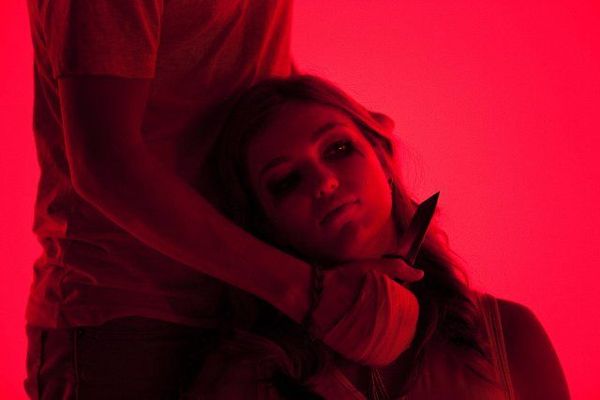Eye For Film >> Movies >> Bad Match (2017) Film Review
Bad Match
Reviewed by: Jennie Kermode

Given that 40 million people now use internet dating in the US alone, it's strange that there have not, to date, been very many films about it. David Chirchirillo's tale illustrates how changes in approach have altered nothing about the fundamental challenges of liaisons between strangers. Both parties can think they're behaving reasonably and things can still go very, very wrong.
Harris (Jack Cutmore-Scott) sees nothing wrong with using internet dating simply as a means of getting laid. He figures that's what most people are there for (though it's not clear if he's actually asked) so no harm done. He's polite, he's friendly, he's ready with an excuse not to spend the night, and he doesn't feel he's setting up any false expectations.
Riley (Lili Simmons) is using internet dating to search for a relationship. She assumes that's what other people - decent people, anyway - use it for. Harris seems like a nice guy, and she can see no reason why he wouldn't want to see her again. Maybe the relationship will work out, maybe it won't, but they can give it a go, right?
Misunderstandings like this happen all the time. they can be stressful, but most of us get over them. The thing is, Riley has problems. She's not emotionally stable; she's needy; she knows it and she tries to manage it, but it is what it is. And if somebody hurts her or simply doesn't seem to care about her feelings, she's not going to take that lying down.
So far, so Fatal Attraction, you might think (even if you haven't noticed that Chirchirillo is using the colour red in the same way as Adrian Lyne), but this is a film that's ultimately going somewhere different - it's closer to what Fatal Attraction was originally supposed to be than what ended up on the screen. It couldn't really have existed before Lyne's film because the social assumptions that crystallised around that are very much a part of what drives the central dynamic, but beyond that it is very much its own animal.
As Harris, Cutmore-Scott is very effective at coming across as an everyman whilst maintaining an edge of darkness that's vital to the film keeping its balance. Simmons gives us a character who is more visibly damaged but still seems, at heart, very ordinary. Crucially, she's ready to acknowledge the sometimes unreasonableness of her actions, whereas it doesn't occur to Harris, comfortably positioned at the centre of his own narrative, that any behaviour of his could overstep the mark. As the tension between them escalates, it becomes apparent that somebody has seriously overstepped the mark, and that an initially awkward situation is headed for tragedy, but Chirchirillo plays on our uncertainties (and cultural prejudices) to keep us guessing.
The film treads a fine balance throughout, making the ending feel too heavy-handed - but then again, perhaps that's necessary in order to ensure that its point isn't lost on those who failed to pay attention to the subtler work. It's still an impressive film and an impressive calling card which one hopes will see Chirchirillo go on to bigger things.
Reviewed on: 29 Aug 2017















